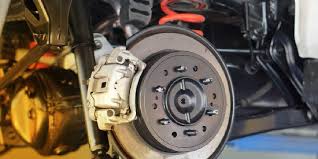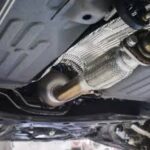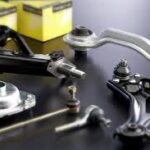Audi Brake System Parts in Chandigarh: Ensuring Safety and Performance
In your Audi, safety is always important, especially the Brake System which is one of the most important pieces of your vehicle’s safety. From excellent performance and reliability the advanced braking technology of Audi is supplied, however all systems have parts that warrant to be replaced or maintained to look after the brake parts on the Audi. If you are in Chandigarh, are in good hands if you have access to fake Audi brake parts which ensure your brakes are in the best condition.
Why Is the Audi Brake System So Important?
Audi has an excellent Brake System and it plays a very vital role in vehicle safety, performance, and control. By breaking the vehicle’s speed to a minimal and the vehicle to a complete stop as required, when the system feels necessary so that you and other people traveling on the road remain, well, safe. To avoid brake failure, to minimize stopping distances, and ultimately ensure driving performance, brake part wears must be replaced at appropriate intervals and it should be maintained on a regular basis.
Audi Brake System Parts Is Critical for Safety Maintenance
This section presents key Audi Brake Parts that need service attention combined with their working mechanisms as safety elements on the road.
1. Brake Pads
Brake pads push against brake rotors to produce the needed stopping force for the vehicle. Brake pads need regular replacement as they provide braking friction until they become too worn from this process.
Your brakes work poorly when brake pads wear out because it takes longer distance to stop and these pads hurt other components like the brake rotors.
2. Brake Rotors (Discs)
Brake rotors are metal discs that perform braking operations together with brake pads. A direct contact of brake pads against rotors produces friction to slow down wheel movement. The brake rotors absorb most of the heat that develops during braking operations.
Regular checks matter because rotor damage grows over time with usage. Bikes must have regular checks to keep brakes working reliably and safely.
3.Brake Calipers
The brake calipers clamp brake pads against the brake rotors to make the necessary brake friction when you use the pedal.
The brake system fails to function properly when the caliper does not work correctly which increases safety risks on the road.
4. Brake Fluid
Brake fluid carries the pressure you put on the brake pedal from the brake pedal to the brake calipers. By eliminating corrosive elements from the braking mechanism it preserves optimal system operation.
The brake system loses its efficiency and could completely fail when brake fluid contains low quality or pollution. Braking power depends on maintaining clean brake fluid through normal fluid checks.
5. Brake Hoses and Lines
The brake hoses and lines move brake fluid through the system to serve the calipers. The manufacturers use strong materials to let brake calipers handle high pressure and intense heat when you brake.
Damage to brake hoses or leaks decreases brake fluid level and creates an immediate failure risk. Regular checks should focus on finding any damage to these brake components.
6. Brake Master Cylinder
The brake master cylinder produces hydraulic pressure in response to brake pedal pressure. The brake master cylinder puts brake fluid into all parts of the braking system.
When your master cylinder breaks it affects brake response and sensitivity making driving dangerous.
7. Brake Pedal and Booster
The brake pedal provides the means to press the braking system. Your pedal pressure is strengthened by the brake booster which lets you stop your vehicle with little force.
When these parts break they cause brake efficiency problems as well as stopping troubles.
8. ABS (Anti-lock Braking System) Components
During hard braking the ABS system stops wheel lockups which allows drivers to control steering and evade slip.
A quality ABS system keeps drivers safe by protecting steering control and reducing skidding in rain or snow weather. Damage to ABS sensors or control units will disable your braking safety protection systems.
Chandigarh Drivers Need to Keep Their Brake System Well Maintained
Being the only city in India that combines urban traffic with highways and diverse roads greatly strains your vehicle’s brake system. Regularly stopping and starting in heavy traffic plus sporadic fast driving will wear out your brake parts sooner. Temperatures from extreme heat to cold winter can weaken the performance of your brake components and fluid in Chandigarh’s climate. Maintaining your Audi brakes according to their schedule allows you to rely on reliable braking power at every moment.
What Should Be The Routine Schedule For Audi Brake Maintenance?
You must take your Audi brake system for service according to your driving style and vehicle type but typically every 30,000 to 50,000 kilometers.
Look for brake pad defects every 20,000 to 30,000 kilometer drive or sooner if required.
Replace brake fluid every two years or 30,000 kilometers regardless of schedule.
Check the brake rotors for wear at least once between 30,000 to 50,000 kilometers of driving.
Identify brake line leaks and caliper wear during each 30,000-kilometer service.
Check your vehicle manual for the exact service intervals which the vehicle manufacturer suggests.
Conclusion
Brake system health depends on using authentic Audi parts which keeps you safe while maintaining excellent vehicle performance and mental comfort. Brake maintenance requires using high-quality replacement parts for all necessary elements in your vehicle. Chandigarh offers different safe options to obtain Audi brake system parts from authorized centers and independent suppliers.
Audi owners should have their brakes checked regularly while replacing worn parts to keep driving safely and enjoy their luxury vehicle’s intended performance. Come to an authorized Audi service center in Chandigarh when you require brake system help and they will provide professional work with genuine Audi parts. Protecting yourself and your vehicle’s performance is highly important.



